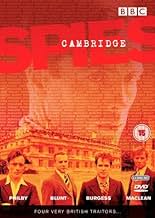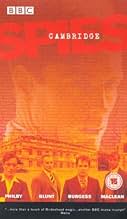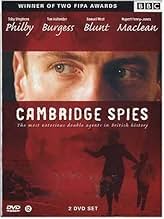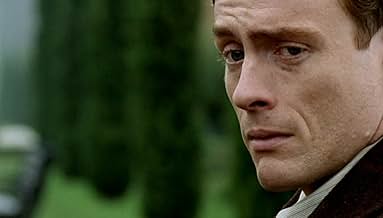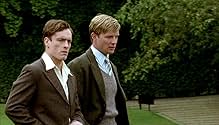Cambridge Spies
- TV Mini Series
- 2003
- 59m
IMDb RATING
7.4/10
2.4K
YOUR RATING
The true story of a group of Cambridge University Students who are recruited to spy for the Soviet Union in the early 1930s.The true story of a group of Cambridge University Students who are recruited to spy for the Soviet Union in the early 1930s.The true story of a group of Cambridge University Students who are recruited to spy for the Soviet Union in the early 1930s.
- Nominated for 4 BAFTA Awards
- 3 wins & 5 nominations total
Browse episodes
Featured reviews
I had heard and read about Kim Philby, of course, but not of the other ones, plus I was not aware of their past and story of formation. Realistic atmosphere, motives well explained and logical, vices and virtues of the protagonists, etc. - everything depicted in a skilful manner. And, of course, the performances, particularly Tom Hollander as Guy Burgess, but also the others - convincing, stylish, but also showing dangers of "elite" and closed communities where depravities are so easy to emerge and develop.
In retrospect, one may ponder on and over how the British authorities were so naive, but, on the other hand, it was an era without much technology and funding to deal with "the own"...
In retrospect, one may ponder on and over how the British authorities were so naive, but, on the other hand, it was an era without much technology and funding to deal with "the own"...
10mattsday
The BBC has once again shown that they can still create top quality drama. While there may be some historical issues with the script, one has to admire the fact that the characters are portrayed accurately and convincingly. Having just seen the last of the four-part series, I can comment that for entertainment value it is top notch.
Sure, some may argue the historical facts are inaccurate, or that the light spun upon the situation is somewhat different to how it was at the time, but much information about the infamous Cambridge spies is uncertain at best - in particular Kim Philby (Toby Stephens) is somewhat a mystery even today. Do not be fooled into thinking that this series is a documentary, it isn't. However, you will be forgiven for thinking that you are watching the actual events, with the locations, pieces and acting all first class.
Watch it with an open mind, as if it is fictional. You will be greatly rewarded, excited and even humoured at how four masterminds underplayed the archaic MI6 for their principals. I'd certainly recommend it.
Overall: 9/10 - Losing the ultimate 1 mark for seeming rushed in parts and sometimes making it hard to understand the relationships between the very complex characters - particularly at the start of the series.
Sure, some may argue the historical facts are inaccurate, or that the light spun upon the situation is somewhat different to how it was at the time, but much information about the infamous Cambridge spies is uncertain at best - in particular Kim Philby (Toby Stephens) is somewhat a mystery even today. Do not be fooled into thinking that this series is a documentary, it isn't. However, you will be forgiven for thinking that you are watching the actual events, with the locations, pieces and acting all first class.
Watch it with an open mind, as if it is fictional. You will be greatly rewarded, excited and even humoured at how four masterminds underplayed the archaic MI6 for their principals. I'd certainly recommend it.
Overall: 9/10 - Losing the ultimate 1 mark for seeming rushed in parts and sometimes making it hard to understand the relationships between the very complex characters - particularly at the start of the series.
Cambridge Spies is glamorous, intelligent and exciting - a winning formula! The acting is brilliant and the editing very stylish. The plot is slightly hard to catch at times, but it doesn't matter as the locations are stunning and performances touching. Great TV!
Since no one has said so yet, it seems necessary to add this.
The series is an excellent drama, in every way - no doubt about that. Well worth watching.
BUT.
And that is the point: The subject of this drama is politics, international affairs, government, intelligence - and these are largely absent from the drama.
So if you are prepared to enjoy a view of the events from the perspective of the personal lives of the main characters, then all is fine. But if you were looking for more than tenuous references to the events and forces at play in the world, and an account of how the characters of the story were involved in those events and forces, you will miss something...
This is not to say that it's a bad drama - it's still excellent. And lavishly designed and produced.
But those political events and forces were of historic importance. At a time where the world was still strongly driven by ideological currents, and there was a ruthless struggle for world domination.
In my view, that is even higher drama, and I missed those connections.
The series is an excellent drama, in every way - no doubt about that. Well worth watching.
BUT.
And that is the point: The subject of this drama is politics, international affairs, government, intelligence - and these are largely absent from the drama.
So if you are prepared to enjoy a view of the events from the perspective of the personal lives of the main characters, then all is fine. But if you were looking for more than tenuous references to the events and forces at play in the world, and an account of how the characters of the story were involved in those events and forces, you will miss something...
This is not to say that it's a bad drama - it's still excellent. And lavishly designed and produced.
But those political events and forces were of historic importance. At a time where the world was still strongly driven by ideological currents, and there was a ruthless struggle for world domination.
In my view, that is even higher drama, and I missed those connections.
This is a lightly fictionalised account of how four tewwibly well brought up English boys betrayed their country to the Soviet Union. Philby's father had been a distinguished diplomat and Arabist and McLean's a cabinet minister. All had public school educations and had been undergraduates at the same Cambridge college. They set off into promising careers in the foreign office and security services and were Soviet agents from the start. Their great coup was to give the Soviets enough details about the atomic bomb to speed up their program to build one by a couple of years, but it was at the expense of blowing McLean and Burgess's cover (they escaped to Moscow in 1951), and Philby being fired from MI6. He joined them in Moscow in 1963. Blunt, by now the Keeper of the Queen's Pictures was then interrogated; he confessed, and was let go.
It's one of the really great spy stories of the 20th century. This version concentrates on the personal dynamics. The amount of contact the spies had with each other after Cambridge seems to be much exaggerated (pretty bad security), but gives us the picture of the gang of four against the Establishment. The women are interesting too. Philby was a ladies' man to whom Donald McLean's American wife Melinda (Anne-Louise Plowman) was attracted. They later lived together in Moscow. Blunt and Burgess were both gay, but friends rather than lovers.
The Establishment, in the person of Lord Halifax (James Fox), Ambassador to Washington, found it difficult to believe that 'people like us' could do such things and started looking for the atomic spy in the embassy kitchens. One or two western counter-intelligence operatives including the CIA's formidable James Jesus Angleton nearly nabbed them, but with Philby tipping them off (and duchessing Angleton), Burgess and McLean made it safely to Moscow.
With four hours to play with all the characters are richly drawn. Tom Hollander's Guy Burgess is a drunken dirty little sod who somehow manages to be witty and charming as well. It was great cover for a spy. As Donald McLean, Rupert Penry-Jones is the Golden Boy who feels himself unworthy, and sees communism as the way to redemption. Toby Stephens as Kim Philby gives us the cleverness, the deviousness and the angst as well, especially in the Spanish episode.(I'm afraid us Philbys are a devious lot, but we bleed, we bleed). Samuel West's Blunt has the occasional hint of emotion, but basically is a cold fish. Art, it seems is his life. He does get on tewwibly well with the Queen.
Seventy years on, it's not so much why they did it, but why they kept it up that mystifies. Given their location close to the heart of British Intelligence and hence knowing as much as anybody outside about what really went on the Soviet Union, it's extraordinary that Philby and McLean in particular continued on right up to 1951 (Blunt was more or less inactive after 1945). It is suggested here that Ms McLean did try to get her husband to give up spying but there's no real explanation as to why he persisted. Perhaps he still believed. Anyway, truth or fiction is hardly the point here - Sunday night is not for history lessons. This is a familiar tale well told, visually splendid and not too taxing. The real story, I suspect, is far too complex for even the most adroit (or left) TV producer. An earlier TV account,"Philby Burgess and McLean" (1977) is also worth watching, if you can find it.
It's one of the really great spy stories of the 20th century. This version concentrates on the personal dynamics. The amount of contact the spies had with each other after Cambridge seems to be much exaggerated (pretty bad security), but gives us the picture of the gang of four against the Establishment. The women are interesting too. Philby was a ladies' man to whom Donald McLean's American wife Melinda (Anne-Louise Plowman) was attracted. They later lived together in Moscow. Blunt and Burgess were both gay, but friends rather than lovers.
The Establishment, in the person of Lord Halifax (James Fox), Ambassador to Washington, found it difficult to believe that 'people like us' could do such things and started looking for the atomic spy in the embassy kitchens. One or two western counter-intelligence operatives including the CIA's formidable James Jesus Angleton nearly nabbed them, but with Philby tipping them off (and duchessing Angleton), Burgess and McLean made it safely to Moscow.
With four hours to play with all the characters are richly drawn. Tom Hollander's Guy Burgess is a drunken dirty little sod who somehow manages to be witty and charming as well. It was great cover for a spy. As Donald McLean, Rupert Penry-Jones is the Golden Boy who feels himself unworthy, and sees communism as the way to redemption. Toby Stephens as Kim Philby gives us the cleverness, the deviousness and the angst as well, especially in the Spanish episode.(I'm afraid us Philbys are a devious lot, but we bleed, we bleed). Samuel West's Blunt has the occasional hint of emotion, but basically is a cold fish. Art, it seems is his life. He does get on tewwibly well with the Queen.
Seventy years on, it's not so much why they did it, but why they kept it up that mystifies. Given their location close to the heart of British Intelligence and hence knowing as much as anybody outside about what really went on the Soviet Union, it's extraordinary that Philby and McLean in particular continued on right up to 1951 (Blunt was more or less inactive after 1945). It is suggested here that Ms McLean did try to get her husband to give up spying but there's no real explanation as to why he persisted. Perhaps he still believed. Anyway, truth or fiction is hardly the point here - Sunday night is not for history lessons. This is a familiar tale well told, visually splendid and not too taxing. The real story, I suspect, is far too complex for even the most adroit (or left) TV producer. An earlier TV account,"Philby Burgess and McLean" (1977) is also worth watching, if you can find it.
Did you know
- TriviaSamuel West, who portrays Anthony Blunt in this series, played the same role 16 years later in season 3, episode 1 of The Crown (2016).
- GoofsAnthony Blunt is referred to as a relative by the Prince of Wales (Edward VIII). Blunt was actually a second cousin of Elizabeth wife of George VI (later the Queen Mother) and not related to the Windsors at all.
- Quotes
Guy Burgess: Vladivostok, Moscow, the Kusnetsk Basin, Cambridge - the coldest places on Earth. Of the four, Cambridge is the coldest, permanently February the nineteenth.
- ConnectionsVersion of Philby, Burgess and Maclean (1977)
- SoundtracksJerusalem
by Hubert Parry
Details
- Release date
- Country of origin
- Official site
- Language
- Also known as
- Espías de Cambridge
- Filming locations
- Production companies
- See more company credits at IMDbPro
Contribute to this page
Suggest an edit or add missing content

